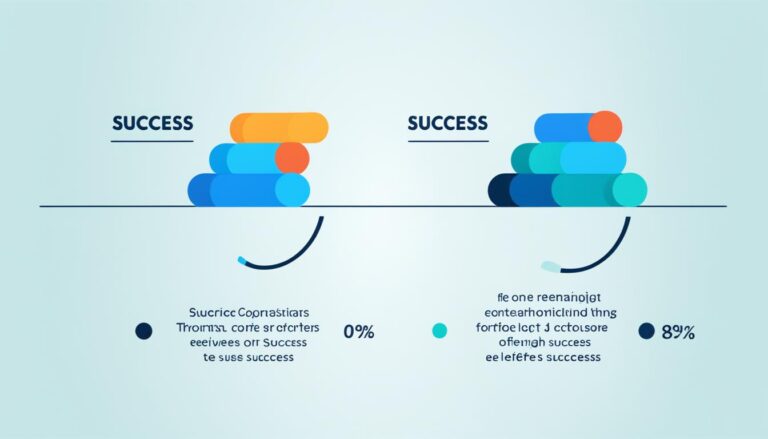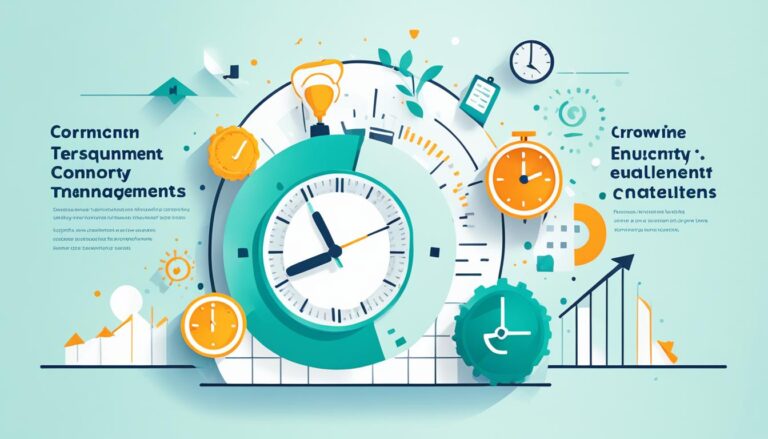Master Real Time Management & Transform Your Day

Do you ever find yourself constantly rushing, overwhelmed by the never-ending tasks on your to-do list? Are you struggling to be productive and efficient with your time? It’s time to delve into the world of real time management and unlock the secrets to transforming your day.
Real time management is not just about ticking off items on your checklist. It’s about maximizing your productivity, making better decisions, and achieving your goals with ease. By implementing effective strategies and utilizing real time productivity tools such as time tracking software, real time scheduling, and real time work monitoring, you can revolutionize the way you manage your time.
Are you ready to take control of your day and experience the true power of efficient time management? Let’s explore the key techniques and principles that will enable you to harness every precious moment and achieve remarkable results.
Key Takeaways:
- Prioritize tasks and set SMART goals
- Eliminate distractions and leverage technology wisely
- Delegate and collaborate to lighten your workload
- Learn to say no to non-essential commitments
- Take regular breaks and prioritize self-care
The Fundamentals of Effective Time Management
Prioritizing tasks is vital for effective time management. When you have a long list of tasks to accomplish, it’s important to identify which ones are the most important and require immediate attention. By prioritizing tasks, you can ensure that you focus your time and energy on the activities that will bring the most value and yield the best results.
A helpful technique to prioritize tasks is by using the time blocking method. This involves allocating specific time slots to different tasks or categories of work. By dedicating specific blocks of time to specific tasks, you can maintain focus and avoid getting overwhelmed by a long list of to-dos. It also helps you to allocate time for important and urgent tasks while ensuring that you have a well-rounded schedule that includes time for strategic projects and personal activities.
Setting SMART goals is another fundamental aspect of effective time management. SMART stands for Specific, Measurable, Achievable, Relevant, and Time-bound. When you set SMART goals, you provide yourself with clear objectives that are specific, quantifiable, realistic, and time-bound. This helps you stay focused, measure your progress, and maintain motivation as you work towards achieving your goals.
To effectively manage your time, it’s important to eliminate distractions in your work environment. Distractions can take various forms, such as social media notifications, email alerts, or the presence of noisy colleagues. By minimizing distractions and creating a conducive workspace, you can optimize your productivity and concentration levels.
Technology can be a powerful tool for enhancing time management. Use technology wisely by leveraging productivity apps, time tracking software, and automation tools that can streamline your workflow and help you stay organized. Take advantage of digital calendars, task management apps, and collaboration platforms to stay on top of your tasks and deadlines.
Delegate tasks when possible and collaborate with others to optimize your time and resources. Delegating responsibilities to capable colleagues or outsourcing certain tasks can free up your time to focus on higher-value activities. Collaborating with others can also provide fresh perspectives, share the workload, and foster creativity and innovation.
Learning to say no is an essential skill in effective time management. It’s important to assess your commitments and obligations realistically and prioritize those that align with your goals and values. Saying no to non-essential commitments allows you to protect your time and energy for activities that are truly important and meaningful.
While it may seem counterintuitive, taking regular breaks can actually enhance productivity. Strategic breaks help to rejuvenate your mind and prevent burnout. Use your break time to relax, engage in physical activity, or pursue a hobby that brings you joy. By taking regular breaks, you can maintain focus and sustain your productivity throughout the day.
Regularly reviewing your progress and reflecting on your time management strategies is crucial for continual improvement. Assess what is working well and what can be improved, and make necessary adjustments to your routines and practices. Reflection allows you to identify patterns, learn from past experiences, and refine your approach to time management.
Finally, prioritize self-care as an integral part of effective time management. Engage in activities that nourish your physical, mental, and emotional well-being. Take care of your health through regular exercise, adequate sleep, and a balanced diet. Make time for relaxation and leisure activities to recharge your energy levels. Remember, taking care of yourself is not a luxury; it is a necessity for long-term success and happiness.
Strategies for Effective Time Management
A Practical Guide to Mastering Time Management
In today’s fast-paced world, mastering time management is essential for finding balance between work, personal life, and self-care. By following a practical guide, you can effectively manage your time, achieve your goals, and lead a more fulfilling life.
1. Define Your Priorities
To start mastering time management, it’s crucial to define your priorities. Take a step back and evaluate what truly matters to you in work and personal life. By identifying your top priorities, you can allocate your time and energy accordingly.
2. Set SMART Goals
SMART goals are Specific, Measurable, Achievable, Relevant, and Time-bound. Setting SMART goals helps you stay focused and motivated. Break down your larger goals into smaller, actionable steps, and assign realistic deadlines to ensure progress.
3. Create a Schedule
Create a schedule that reflects your priorities and goals. Use a digital or paper planner to visually map out your days, weeks, and months. Allocating time slots for different activities helps you stay organized and ensures that nothing important falls through the cracks.
4. Time Blocking
Time blocking is a technique where you assign specific time periods for specific tasks or activities. By dedicating uninterrupted blocks of time to focused work, you can enhance productivity and minimize distractions.
5. Minimize Distractions
Avoid common distractions such as social media, email notifications, or excessive multitasking. Find strategies to limit interruptions and create a conducive environment for deep work. Consider using website blockers or turning off notifications during designated work periods.
6. Learn to Say No
Saying no to non-essential commitments is essential for focusing on your priorities. Understand that your time and energy are valuable resources. Politely decline requests that don’t align with your goals or values.
7. Take Strategic Breaks
Strategic breaks throughout the day are crucial for maintaining focus and sustaining energy levels. Engage in activities that help you recharge, such as going for a walk, practicing mindfulness, or having a healthy snack.
8. Regular Review and Adjustment
Regularly review your schedule and assess whether it aligns with your priorities and goals. Make adjustments as needed and be flexible in responding to unexpected changes. Keep in mind that time management is an ongoing process that requires constant evaluation and adjustment.
9. Prioritize Self-Care
Don’t neglect self-care while managing your responsibilities. Prioritize activities that promote physical, mental, and emotional well-being. Whether it’s exercising, meditating, spending time with loved ones, or pursuing hobbies, ensure that self-care is an integral part of your time management strategy.

By following this practical guide to mastering time management, you can create a balanced and fulfilling life. Remember to define priorities, set SMART goals, create a schedule, use time blocking, minimize distractions, learn to say no, take strategic breaks, regularly review and adjust, and prioritize self-care. With these strategies in place, you’ll be well on your way to maximizing your productivity and finding harmony in your work and personal life.
The Importance of Valuing Time
Time management plays a crucial role in all aspects of life. It is not just a matter of being organized and efficient; it can have far-reaching impacts on our health, relationships, and overall well-being. When we fail to value and manage our time effectively, we risk wasting valuable moments on distractions and neglecting important areas of our lives.
One of the key consequences of poor time management is a lack of work-life balance. In today’s fast-paced world, it’s easy to get caught up in the demands of work and neglect our personal lives. This imbalance can lead to increased stress, fatigue, and even burnout. It affects our mental and physical health, causing a decline in overall well-being.
Moreover, when we allow distractions to consume our time, whether it’s mindlessly scrolling through social media or getting lost in non-essential tasks, we hinder our productivity. By giving in to these distractions, we rob ourselves of the opportunity to make meaningful progress toward our goals and aspirations.
Valuing time, on the other hand, allows us to be more efficient and productive. When we prioritize our tasks and allocate time to what truly matters, we can accomplish more in less time. This not only boosts our productivity but also creates a sense of accomplishment and fulfillment.
A critical aspect of valuing time is establishing clear boundaries between work and personal life. By creating dedicated time for each and respecting those boundaries, we can maintain a healthy work-life separation. This separation is essential for maintaining strong relationships, nurturing our passions and hobbies, and taking care of our mental and physical well-being.
Recognizing the importance of time management is not a new concept. Throughout history, successful individuals have understood the value of effectively managing their time. From ancient philosophers to modern entrepreneurs, they have recognized that time is a limited resource that must be used wisely.
Fortunately, there are numerous time management tips and techniques available to help us make the most of our time. These range from setting specific goals, creating schedules and using technology wisely, to learning to say no, taking strategic breaks, and prioritizing self-care. By incorporating these time management principles into our daily routines, we can experience significant improvements in our productivity, relationships, and overall quality of life.

Conclusion
Mastering time management is the key to unlocking a successful and happy life. Incorporating time management principles into your daily routine allows you to make the most of your precious time and achieve your goals with greater efficiency.
By prioritizing tasks, setting clear and SMART goals, and creating schedules, you can optimize your productivity and ensure that your time is spent on activities that truly matter. Minimizing distractions and learning to say no to non-essential commitments further empowers you to stay focused and in control of your time.
Taking strategic breaks and prioritizing self-care are equally important aspects of effective time management. These practices not only rejuvenate your mind and body, but also improve your overall well-being and enable you to sustain high levels of performance in the long run.
Remember, valuing and effectively managing your time is the key to leading a fulfilling and purposeful life. Start incorporating these time management principles into your daily routine and watch as you master your time and unlock your full potential.
FAQ
Why is effective time management important?
Effective time management is essential for leading a purposeful and fulfilling life. It helps you prioritize tasks, stay organized, and achieve your goals efficiently.
What are some key principles of time management?
Prioritizing tasks, using time blocking, setting SMART goals, eliminating distractions, leveraging technology, delegating and collaborating, learning to say no, taking regular breaks, reviewing and reflecting, and prioritizing self-care are some key principles of time management.
How can I prioritize tasks effectively?
To prioritize tasks effectively, you can use various strategies such as categorizing tasks based on urgency and importance, assigning deadlines, and considering the impact of each task on your overall goals.
How can time blocking help with managing my time?
Time blocking is a method where you allocate specific time slots to different tasks or categories of work. It helps you create a structured schedule and ensures you dedicate focused time to each task or activity.
What are SMART goals and how do they contribute to effective time management?
SMART goals are goals that are Specific, Measurable, Achievable, Relevant, and Time-bound. Setting SMART goals helps you clarify what you want to accomplish, create a clear plan of action, and stay on track with your time management efforts.
How can I minimize distractions in my work environment?
Minimizing distractions involves creating a distraction-free workspace, turning off notifications on your devices, setting boundaries with colleagues or family members, and using productivity tools that block or limit distractions.
What role does technology play in time management?
Technology can be both a blessing and a curse when it comes to time management. By using time tracking software, real-time scheduling tools, and productivity apps, you can streamline your workflow and enhance your productivity. However, it’s important to use technology wisely and avoid getting distracted by non-productive digital activities.
How can I delegate tasks and collaborate effectively?
Delegating tasks involves assigning specific responsibilities to others who have the necessary skills and resources. Effective collaboration includes clear communication, shared goals, leveraging each team member’s strengths, and using collaborative tools to facilitate teamwork.
Why is it important to learn to say no?
Learning to say no is crucial for effective time management because it helps you avoid taking on commitments or tasks that do not align with your priorities or overload your schedule. It allows you to protect your time and focus on what truly matters.
How do regular breaks contribute to time management?
Regular breaks are essential for maintaining focus, preventing burnout, and recharging your energy and creativity. Taking short breaks at intervals throughout the day can help you stay refreshed and perform better in your tasks.
What is the importance of reviewing and reflecting on your time management strategies?
Regularly reviewing and reflecting on your time management strategies allows you to assess what is working well and what needs improvement. It helps you identify patterns, make necessary adjustments, and continuously enhance your productivity and effectiveness.
Why should I prioritize self-care in time management?
Prioritizing self-care is crucial for maintaining overall well-being and ensuring sustainable productivity. Taking care of your physical and mental health, practicing work-life balance, and engaging in activities that recharge you positively impact your ability to manage time effectively.






